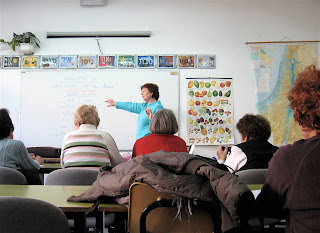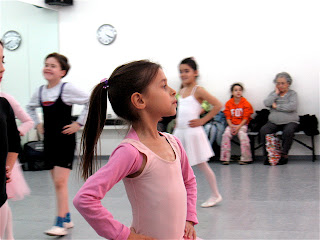 Assuming that, like my mother, I would live a full three-act life, I considered carefully the form and content of the third-third of mine. As the curtain rose on act three, I was hoping to shape a dramatic work that would incorporate meaningful new experiences and establish a sense of belonging to a land I where I was born yet barely knew. And so I made aliya (ascension, in Hebrew) in late 2002 and launched my bihemispheral life, splitting the years into near-equal parts between Atlanta, Georgia, and Tel Aviv.
Assuming that, like my mother, I would live a full three-act life, I considered carefully the form and content of the third-third of mine. As the curtain rose on act three, I was hoping to shape a dramatic work that would incorporate meaningful new experiences and establish a sense of belonging to a land I where I was born yet barely knew. And so I made aliya (ascension, in Hebrew) in late 2002 and launched my bihemispheral life, splitting the years into near-equal parts between Atlanta, Georgia, and Tel Aviv.Priority: update and retool
I was on terra firma in the northeast United States (from Manhattan to Boston; Washington, DC; and Atlanta). Yet living in Israel after decades of merely vicarious experiences (a rich Jewish education, including Hebrew language study at home, in school, at summer camp) and short stints to the motherland required jump-starting assimilation into my new-old home. While my Hebrew was OK, it lacked fluency in the slang and neologisms coined since the Hebrew Bible was canonized! (Toothbrush, computer, WIFI, parking lot, as examples, do not appear in the Five Books of Moses, no matter how closely I studied source texts and commentaries!)
Curriculum (draft)
 I aimed to improve my Hebrew immediately (next, learn Arabic) while steadily understanding better the social, historical, and political contexts of contemporary Israel and the cultural norms of my fellow Israelis. I wanted to explore how Herzl's dream, modern political Zionism — the international political movement that since the late 19th century has supported the ingathering of Jewish exiles to their ancestral homeland, had fared and morphed.
I aimed to improve my Hebrew immediately (next, learn Arabic) while steadily understanding better the social, historical, and political contexts of contemporary Israel and the cultural norms of my fellow Israelis. I wanted to explore how Herzl's dream, modern political Zionism — the international political movement that since the late 19th century has supported the ingathering of Jewish exiles to their ancestral homeland, had fared and morphed. "Learning Hebrew grammar is like learning math," said Leah, my language teacher at the Gordon ulpan, a center for the intensive study of Hebrew. "And, if you're good at either subject, you’re on your way to conquering the other." Hmm. My perfect excuse to forget learning grammar.
"Learning Hebrew grammar is like learning math," said Leah, my language teacher at the Gordon ulpan, a center for the intensive study of Hebrew. "And, if you're good at either subject, you’re on your way to conquering the other." Hmm. My perfect excuse to forget learning grammar.I discovered that studying the Middle East rigorously is endlessly complex and, endless. And, similar to the search for truth, studying yields a mass of opinions and interpretations, each tinted with bias, subjectivity, and contradiction.
What is a late learner to do?
How would I identify the evolving issues and changing demographics over the decades? Where were the quick tips on “getting” the confusing manners and mores? And who wrote the manual on following increasingly complex political and security matters, not to mention instructions on navigating government bureaucracies (Ministry of Immigrant Absorption, for instance) and negotiating with national health services and banks, among other institutions?
Short answer: I couldn’t find all the answers (nor ask all the questions) in one act, not even three! I needed to cobble Plan B: A fast path to figuring out my new-old home. The plan would become a Who, What, Why, Where, When, and How of a detective thriller (in development).
A blessing and two not-so-secret ingredients
- The blessing: A community of Israeli family and friends that provides support, caring, and vital life-affirming adventures, and with whom I observe the Jewish calendar and witness life cycle events. This blessing enhances my life's meanings, sharpens my values, and informs my choices. And, it helps cushion routine bumps and blows of immigration.
(To meet some players, visit Gila, Shimon, and Tova here; Noam and Aviah here; Noam; Daniel; Ohad and Aviah here; Ohad; Susanne; Shimon; my childhood friend; Miriam; and again, Ohad and Aviah.)
- Ingredient 1: Steadily attending weekly classes at ulpan and in a modern Israeli literature course (including doing homework and reading the assignments!).
- Ingredient 2: Regularly viewing documentary films in Hebrew at the Tel Aviv Cinemateque Library with the Librarian Dror's expert guidance. This lens on Israel's ancient multicultural history, its kaleidoscopic soul, and the passions that fuel it has been my key source of answers and more questions.
I am interested in your comments on points this post touches. If you have experience acclimating to bihemispheral living, expat living, overseas
 assignments, or even moving to another city or state in the same country — please share lessons you learned, tips, cheat sheets, how-to's, or handy hints on moving from surviving to thriving.
assignments, or even moving to another city or state in the same country — please share lessons you learned, tips, cheat sheets, how-to's, or handy hints on moving from surviving to thriving.

